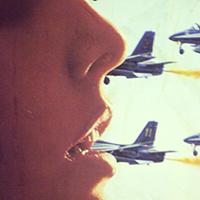"HARBOR from POLIS"
The more we comprehend our own harbors, the better we imagine the contents of other worlds.
It is possible to think of a harbor as an ideology expressed in objects. But that does not account for what remains. Each municipality pulses at one end of a peristaltic order pushing things from a sea. Families arrive on highways unfolding belongings after long transport, emplacing themselves in multileveled green and cantilevered neighborhoods, cozying to home, where the home is a cavity in the public. And of course there is no warrant for any of this. We simply as citizens of an atmosphere collect and do and repair, unaware as to what creature we are, even as the harbor remarks the distance: brought, catalogued, microcospic, an entablature of nations, enrhythmed to planetary want, an agreed area of transfer in the relations by which surplus of one region meets and fashions the needs of another.
We may call it "trade" but we don't know what it is. Though we have engaged this systematizing of replacement well before writing, and used the sea this liquid compound as a basal condition for the mitigation of friction in transport loosened by an industry that anticipates the breakage of goods, restoring items lost in the trebles of corruption, destruction, neglect, such that even the rivers are thin tentacular arrangements by which is addressed a continent's systemic losses, we know too this also has nothing to do with replacement.
It is more that the objects of industry enter into flares of preparedness, potential interest, use, becoming future subjects of charts, diaries, games; they collect in heat and error at hands, causing action, being placed on boats, sometimes slight bodies having brought them, lodged before eyes on trucks enlarded with the insignia of inland corporations, and then, absent notice, these same slide from attention, broken, old, old-fashioned, exceeded, discarded in bags, come apart in a batter of particles, found dismantled in receptacles, partially oxidized, left near damaged animals at the edges of roads. They are leaked from lintels of cabs, impelled in the thuds called from the street by potholes, sometimes complementing by their mere bruising in daily use the range of humilities exchanged in slaps that were themselves summoned from arms, and so spent on faces in small percussions of indignation and even justice such that there is a self-camouflaged peristalsis to manufacture and decay.
And of course evidence of origin dissipates. Everything in the harbor is pinned to something else, waits compact and languid, stored for further shipment. Inside the embayments the hulls bundle accoutrements of marriage, wire rope, parts for lamps, pieces of retaining wall suited for karst regions. Pots of glue and other liquid tools of retention are held there in harbors replete with pre-pieces, furnitures, vehicular modules, seeds and agricultural machine, micrometers and camping grommets, plastic contrivances for hair arrangement, small decal, mauls for drusy and thin ores, the talocrural sections of manikin, mirrors to expel the human image, buttons cut from river mussels, and here the sides of lights, armatures for looms, alloyed fixture, jigs and other polygonal templates for the fuss of odd motion, each thing of pieces that were themselves assembled after long transport and political arrangement; toys to soften the loudness in babies, smells from new dyes in piles of damp textile; pads of ruled paper, its inks from lakeside soys; new wind turbines whose components were designed two decades ago. Maple podiums for schools, crates of garden trowels chiefly for those towns established on vast deposits of effluvia, and items for the industry that answers the menaces that storms are to industry.
The ships that walk the storms whose anchors score the harbor muds slide now in the spits of otters, laden vessels everywhere tethered over shallow dishes of rock, snots and phyllosilicates and metals on their hulls, the variants of the same minerals lodged and strewn on the hills above the harbors.
We mostly handle the tools whose use has to do with roads and those implements associated principally with kitchens: these two areas of human life marked by continual disturbance and effort, matter's linear motion and its circulant mixing. What in this smashed original cluster is primary? Can we really name one thing that is in our galaxy?
The atmosphere is a bolster between the harbor's depots and the cities of the interior, sounds of lading and transfer dissipate on the tops of forests. Across the surrounding plains, down roads and under virga, knocks and ringing thin to nothing inside the shelves of shifting wind.
Back to The Issue | Back to the Top
Author Bio: Gabriel Gudding is the author of Literature for Nonhumans (Ahsahta, 2015), Rhode Island Notebook (Dalkey Archive Press, 2007) and A Defense of Poetry (Pitt, 2002), as well as numerous chapbooks. His essays and poems appear in such periodicals as Harper’s Magazine, The Nation, and Journal of the History of Ideas, in such anthologies as Great American Prose Poems, Best American Poetry, Best American Experimental Writing, and &Now: Best Innovative Writing. His translations from Spanish appear in anthologies such as The Oxford Book of Latin American Poetry, Poems for the Millennium, and The Whole Island: Six Decades of Cuban Poetry.
